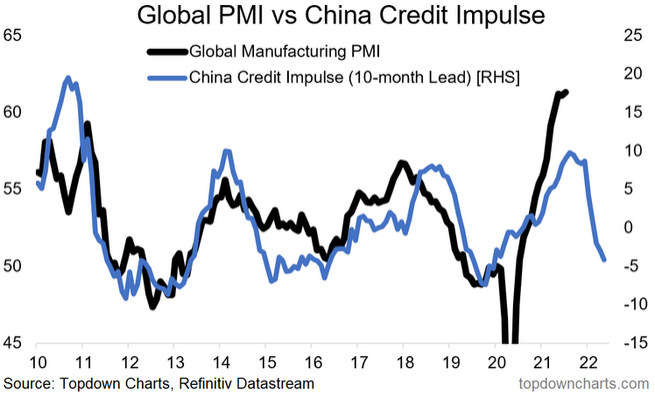The China credit impulse indicator has turned sharply downward. During the past decade this would normally be considered a dire signal for the global economy.
Indeed, even if we look at other indicators such as the fiscal impulse and broader monetary conditions indicators (as mentioned in our latest weekly report), we find China zigging on policy while the rest of the world is zagging.
Strategists have relied on this indicator because over the past decade it’s signaled turns in the global economic pulse like clockwork.

But as I noted last week (divergence between China vs global PMIs), things are different this time. China may be showing absolute and relative forbearance on policy stimulus, but the rest of the world threw everything at it—with a historic, rapid, globally coordinated, innovative, fiscal + monetary stimulus effort to combat what many saw as the risk of a global depression.
As such, with respect to the global economy, and with respect to distinctly China-sensitive markets like commodities… maybe this time will indeed be different. To the latter point, the fact we have seen commodity prices by and large go from strength to strength despite China’s policy forbearance probably tells much of the story.
But that doesn’t mean we should ignore China, it remains a critically important macro/market variable, and a downturn in China would not go by unnoticed. We just don’t think the indicator in today’s chart carries the same weight on the global front that it did in recent years.
Where we could be wrong on this would be if the rest of the world suddenly pivoted towards tightening, or if second/third waves threw things off track, or if surging prices and supply chain disruption halted the recovery.
China may well change its tack on policy stimulus if its economy slows further, but until then, it is a chart to be mindful of—but while knowing that things are different this time …”unprecedented”.
Bottom Line: The China credit impulse has turned negative, normally this would be a dire signal for the global economy, but this time things are different as the rest of the world has done all the heavy lifting on the stimulus front.
